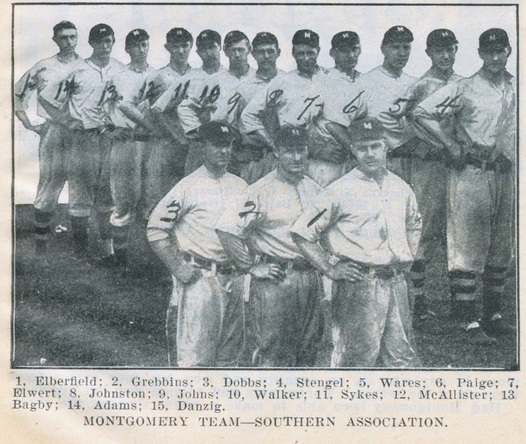You Could Look It Up: The Life of Casey Stengel - Maury Allen, 1979 Times Books
Through it all Stengel prospered. His play improved, his mistakes grew less frequent. He was gaining confidence in his play, confidence in his person, certain he could make the big leagues if he was given the chance. Like most ambitious youngsters in and out of baseball, he became a brain-picker. He would seek out veteran players, ask them about conditions in the big leagues, seek helpful advice, store it and record it in that incredible brain of his, always able to bring the information forth when necessary to help him maximize his physical talents.Stengel had become friendly with a thirty-six-year-old infielder named Norman Arthur (The Tabasco Kid) Elberfeld.
Kid Elberfeld had played in the majors from 1898 to 1911. In 1912 he had been released by the Washington Senators and signed as a free agent with Montgomery. He would return to the majors again in 1914 for a short while as a teammate on the Dodgers of Casey Stengel. Elberfeld was a generous man with his time and his wisdom. Like Stengel, he enjoyed talking baseball for hours at a time.The grizzled old veteran and the blond-haired youngster, recently turned twenty-two, sat together on trains, roomed together in hotels, dined together in restaurants, shared thoughts on the bench and in the hotel lobbies.
Elberfeld, using a short bottle-shaped bat, was a whiz at placing the ball between the fielders. He and Stengel often worked plays where Stengel would start to steal a base and Elberfeld would smack the ball through the vacated infield spot, second base, shortstop, or third base. They had become good friends and now, as almost always happens in baseball, one or the other would move on. This time it was Stengel moving up and the older man staying back. Elberfeld, who had enjoyed his stay in the big leagues, was not resentful as so many older players were in the bitterness of their baseball middle-age.
On September 15,1912, after Stengel had been notified he was to report to Brooklyn for the final three weeks of the Dodger season, Elberfeld organized a small farewell party for the departing friend. He ordered that Stengel buy two jugs of wine for $6.00, buy a new suit ("You gotta dress like a big leaguer before they believe you are one," Elberfeld said) for $22.00, and a new suitcase for $17.50.
The players partied until the wine emptied. Then, singing lustily, they walked with Stengel to the train station."Keep your ears open and your mouth shut up there," said Elberfeld.
It was wonderful advice for most players going to the big leagues. For Charles Dillon Stengel it just wouldn't work. His mouth was as much a part of his game as his bat, ball, and glove.
Product Details
Kid Elberfeld had played in the majors from 1898 to 1911. In 1912 he had been released by the Washington Senators and signed as a free agent with Montgomery. He would return to the majors again in 1914 for a short while as a teammate on the Dodgers of Casey Stengel. Elberfeld was a generous man with his time and his wisdom. Like Stengel, he enjoyed talking baseball for hours at a time.The grizzled old veteran and the blond-haired youngster, recently turned twenty-two, sat together on trains, roomed together in hotels, dined together in restaurants, shared thoughts on the bench and in the hotel lobbies.
Elberfeld, using a short bottle-shaped bat, was a whiz at placing the ball between the fielders. He and Stengel often worked plays where Stengel would start to steal a base and Elberfeld would smack the ball through the vacated infield spot, second base, shortstop, or third base. They had become good friends and now, as almost always happens in baseball, one or the other would move on. This time it was Stengel moving up and the older man staying back. Elberfeld, who had enjoyed his stay in the big leagues, was not resentful as so many older players were in the bitterness of their baseball middle-age.
On September 15,1912, after Stengel had been notified he was to report to Brooklyn for the final three weeks of the Dodger season, Elberfeld organized a small farewell party for the departing friend. He ordered that Stengel buy two jugs of wine for $6.00, buy a new suit ("You gotta dress like a big leaguer before they believe you are one," Elberfeld said) for $22.00, and a new suitcase for $17.50.
The players partied until the wine emptied. Then, singing lustily, they walked with Stengel to the train station."Keep your ears open and your mouth shut up there," said Elberfeld.
It was wonderful advice for most players going to the big leagues. For Charles Dillon Stengel it just wouldn't work. His mouth was as much a part of his game as his bat, ball, and glove.
Product Details
- Hardcover: 310 pages
- Publisher: Times Books (1979)
- Language: English
- ISBN-10: 0812908309
- ISBN-13: 978-0812908305
- Product Dimensions: 8.2 x 5.4 x 0.8 inches
- Shipping Weight: 1.2 pounds
- Average Customer Review: 5.0 out of 5 stars
- Amazon Best Sellers Rank: #3,366,335 in Books
Elberfeld and Stengel on the Montgomery team.




